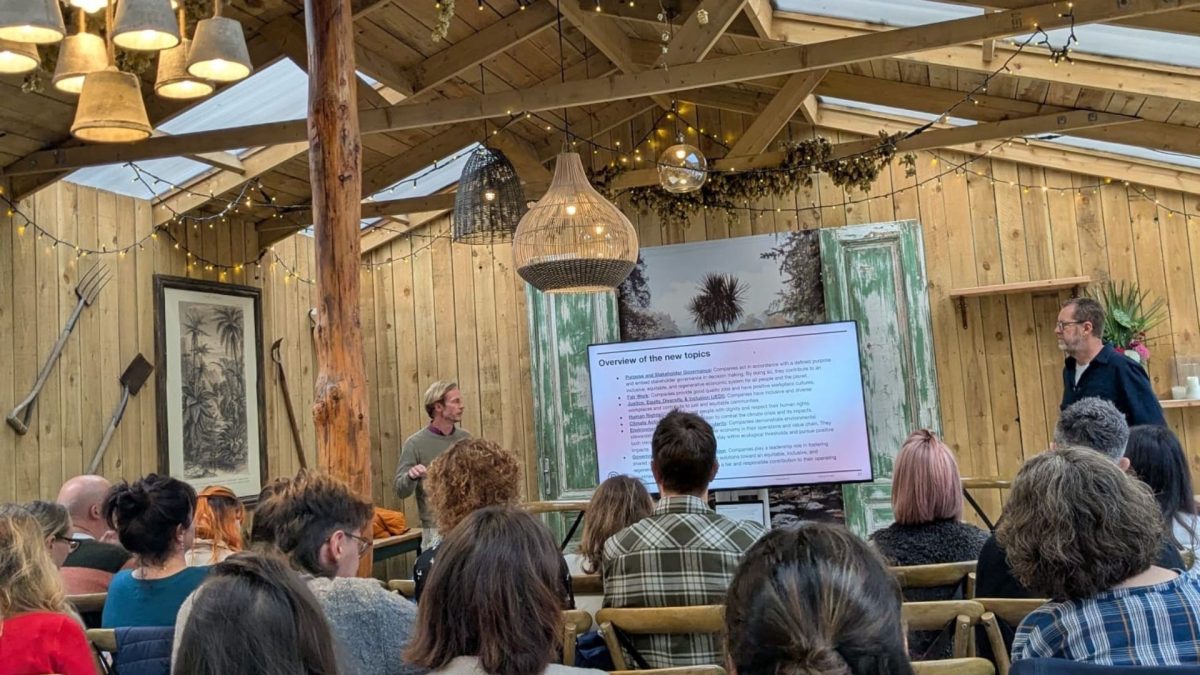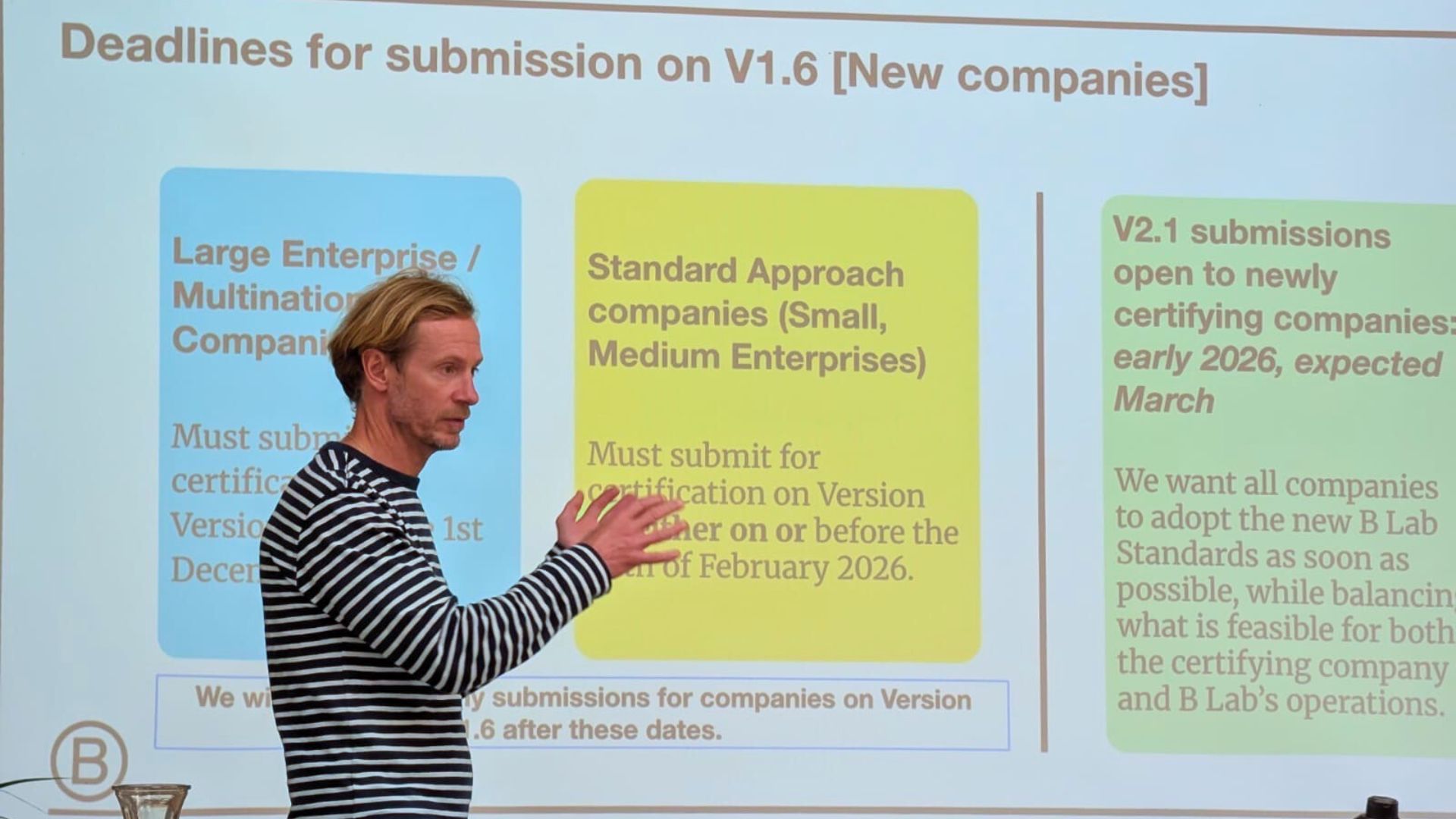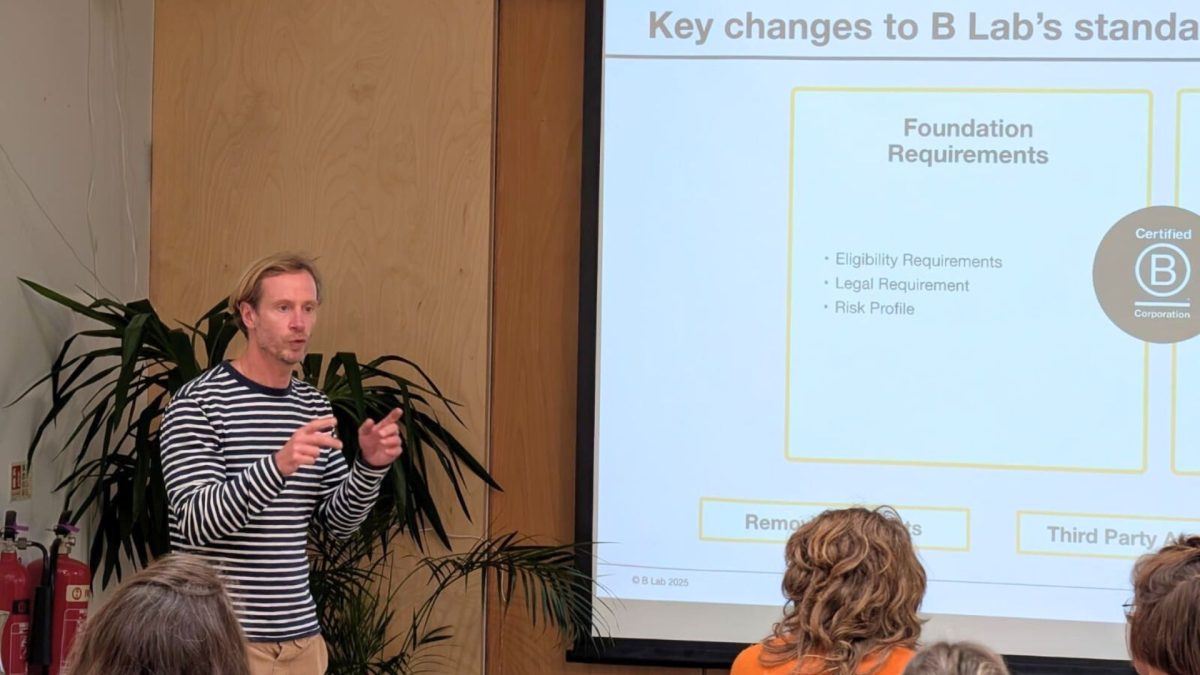In April B Lab introduced a long-awaited update to the B Corp certification standards replacing the points-based system in one of the biggest overhauls since the movement began 19 years ago. The changes are designed to raise the bar for what it means to be a B Corp and spur business action on the world’s rather urgent social and environmental issues.
Last week, I had the privilege of presenting an overview of the changes to the B Local Cornwall group. We’ve got a growing community of 80+ businesses pioneering business as a force for good, so it was good to have a space to explore how people are feeling about the new standards. Now that training is rolling out for B Leaders, I wanted to share some honest reflections on this evolution.
Long overdue, but rushed
Let me start with a contradiction: these new standards were desperately needed, but the launch felt rushed.
Having recertified twice under the latest standards (V6 now V1.6), I can confirm the update was long overdue. B Lab Global ran extensive feedback loops to gather insights from the community, and we could see the thoughtful consideration going into the design. But when launch day arrived? It felt like a company releasing a product without first explaining to their employees how it works.
The B Leader community and B Corp consultants needed training before the launch, not after. We’re the ones on the ground, supporting organisations through this transition, and we were left scrambling to understand the new framework alongside everyone else.

Goodbye points, hello principles
Despite my frustrations with the rollout, I fully support raising the bar.
I’ll be honest – I’ll miss the points system. As someone who is competitive by nature, I loved setting clear targets and watching the numbers climb. But the new system does address a fundamental flaw: organisations can no longer get through by scoring high in one area and coast in others. You can’t muddle your way to B Corp status anymore – and that’s obviously a good thing.
Many organisations are understandably anxious about meeting the new baseline. It might feel tough, yes. But B Lab has rightly scaled the requirements based on business size. It’s challenging, not unachievable. And who said change would be easy…
Start as you mean to go on
The new foundation requirements are a brilliant step forward. By establishing upfront whether B Corp is right for your organisation, they’ll eliminate many of the issues companies have faced when they’re already deep into the certification process.
This gatekeeping function isn’t about exclusion – it’s about ensuring organisations understand what they’re committing to from day one.
Stop moving the goalposts
Here’s my plea to B Lab Global: let us get stuck into this new version before releasing further updates.
We need stability – time to learn, adapt and really understand these standards. We’re already on version 2.1, and no organisation has even certified under the new framework yet. Let’s put a stake in the ground and let it stand for a while.
Measuring what matters
One change that’s gone under the radar is the removal of the legal requirement for smaller B Corps to produce an annual impact report. Under the new standards, only large, XL and XXL businesses will need to report — and only from their third year after certifying.
For a movement built on transparency and accountability, that feels like a step backwards.
At LEAP, we’ve always seen impact reporting as so much more than a compliance exercise. A good report isn’t just a communications tool, it’s a record of progress, an opportunity to reflect, and a benchmark for the future. It’s how you track whether the values you talk about are actually showing up in your work.
For any business striving to be better, that kind of reflection is invaluable. It keeps the journey honest. And it reminds us that positive impact isn’t something you get to claim without backing it up – it needs to be measured. It’s something you live and a constant work in progress.
Where are the impact business models?
This is my biggest concern, and I need to address it head-on.
Impact Business Models have always been my specialist subject within the BIA. I’ve long been fascinated and inspired by companies built to deliver positive impact — where social or environmental good isn’t a side project but the whole point.
The B Corp community is full of them: Divine Chocolate’s fair trade ownership model, TOMS’ one-for-one approach, The Big Issue creating opportunity for people experiencing homelessness. These aren’t businesses doing less harm; they’re built to do good.
For Leap, Impact Business Models haven’t been a certification requirement – they’ve been our foundation for two decades. Long before we became a B Corp ten years ago, we built our business around two core models:
Grant for Good – our Design to Give model, where we commit 5% of our turnover to pro bono activity. Not profits. Turnover. This means that supporting organisations to create impact is baked into every client project, every invoice, every year – regardless of whether we have a good year or a challenging one.
Working with purposeful organisations – we’ve intentionally shaped our client base and expertise around supporting organisations creating positive change. It’s not marketing spin; it’s a strategic business model that aligns our commercial success with social and environmental impact.
As a B Leader, I’ve always seen it as my role to help others think about how their business could create more positive impact. Impact Business Models gave us a framework for that — a way to recognise and celebrate organisations going beyond compliance.
But, they’re not part of the new standards.
B Lab Global is looking into it, and I have everything crossed. Because here’s what’s at stake: without them, we risk losing the spotlight on organisations not just meeting the baseline, but going above and beyond in using business as a force for good.

Moving forward
Change is rarely comfortable. The new standards aren’t perfect, and the launch could have been smoother. But the intent is right — to build a more rigorous, more equitable certification that truly reflects the businesses leading the way in stakeholder capitalism.
My hope? That B Lab Global listens to the community feedback, brings back recognition for Impact Business Models, and gives us the stability we need to make these new standards work.
For Leap specifically, these changes prompt an important question. Matt was following the B Corp movement before it even arrived in the UK, and we were early adopters when it did. Ten years into our B Corp journey, with fundamental changes to the standards, it’s right to ask: is B Corp still the right fit for Leap’s future?
I don’t have that answer yet. And that’s okay. Once we’ve got our hands dirty using the new standards, lived with them in practice, wrestled with, and truly understood them, we’ll be in a much better place to decide. I suspect that’s a question many others in the community are asking, too.
To my fellow B Leaders and B Corps navigating this transition: we’re in it together. Let’s give these standards the time and effort they deserve, while continuing to push for the improvements that will make them stronger.
What are your thoughts on the new B Corp standards? I’d love to hear from others in the community about your experiences with the transition.
Resources
- New standards. New tools. Same mission: make business a force for good.
- In August, B Lab published a new Global Certification Hub to create a one-stop-shop for companies to get the latest information regarding the transition to the new B Corp Standards (now known as V2.1).
- B Lab Global has also launched a series of free, on-demand online courses on the new B Lab standards. Each course is about 30-60 minutes and covers the basics with a mix of video and written content, plus quizzes to test your knowledge.
